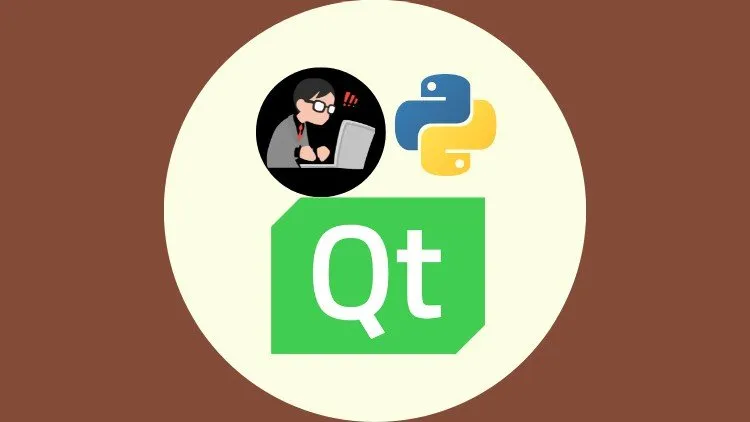Qt For Python (PySide6) GUI For Beginners : The Fundamentals
Build Cross Platform Desktop Applications in Python. Run Them on Windows, Mac and Linux. Build once, Run Everywhere!

Qt For Python (PySide6) GUI For Beginners : The Fundamentals udemy course free download
Build Cross Platform Desktop Applications in Python. Run Them on Windows, Mac and Linux. Build once, Run Everywhere!
What you'll learn:
- The fundamentals of working with Qt to build Gui Applications using PySide6
- Working with Qt Widget Classes
- Working with Dialog Classes
- Using the Qt Resource System
- Using Qt Designer and Qt Creator for Ui Design
- Styling Qt Applications
- Working with Networks to fetch HTTP Data
- Working with the Model View Architecture
- Packaging PySide6 Applications
Requirements:
- Basic Understanding of Python
- Basic knowledge of working with Computers
- Open mind and strong willingness to learn how to build Qt Gui applications with Python
Description:
Welcome to PySide6 GUI Development for Beginners. A course designed to teach you how to build cross platform desktop applications than run on Windows, Mac and Linux, using PySide6, also known as Qt For Python.
Qt is a powerful cross platform app development framework that can be used to build applications targeting a wide range of device platforms including desktop targets like Windows,Linux,Mac; mainstream mobile platforms like Android and Ios, and even embedded devices! Python is now supported as an official language for Qt and you can take advantage of the power of Qt with Python, under the PySide6 or Qt for Python umbrella, and this course is designed to help you start doing just that!
The course assumes no prior knowledge about Qt and methodically guides you though the concepts, constructs and mechanisms needed to get you building your dream GUIs for desktop with Python, using Qt Widgets. By the time you are done with the course, you will not only be armed with knowledge you could use to build basic to intermediate graphical user interface applications, but you will also have enough momentum, to even learn more on you own. As with many of my other courses, I use every chance I get to show you how to use the documentation to find solutions on your own and faster.
Let's take a look at the content of the course.
We start with a complete beginner to Qt in mind, and we take you through the the process of getting your environment set up on your platform of choice :
-
We install Python and PySide6 on our host machine
We then visit the fascinating concept signals and slots in Qt where you learn the most flexible way to respond to events
Next we dive in the Qt Widgets section and visit some of the most important widget classes in Qt :
-
QWidget
-
QMainWindow
-
QMessageBox
-
QPushButton
-
QLineEdit
-
QTextEdit
-
QLabel
-
QHBoxLayout, QVBoxLayout, QGridLayout
-
We visit size policies and stretches and how they help tie the knots in your layouts
-
QCheckBox and QRadioButton
-
QList
-
QComboBox
-
QListWidget
-
QTabWidget
-
QMenu, QToolBar, QAction
Next we look at how to use Qt Designer or Qt Creator to lay out UI components by just dragging and dropping stuff, allowing you to just focus on the logic in your python files.
Dialogs are explored next , we look at QDialog and how to build your own custom dialog class from scratch , QDialogButtonBox, QMessageBox, QFontDialog, QFileDialog, QInputDialog and how they add a layer of interactivity to your Qt GUI applications.
We then go on and explore how to work with the Qt Resource System , Styling your Qt applications with QStyle, QPalette and Style Sheets, Saving your application settings with QSettings, Working with Files and Directories using QFile and QDir, working with the network capabilities of Qt where we :
-
See the different classes that are available to work with networks in Qt
-
Build an application to download web pages in our Qt Applications
-
Build an application to consume Rest APIs in your Qt Applications
and we wrap up the course looking at the Model View Architecture of the Qt framework where we learn about classes like
-
QListWidget
-
QTableWidget
-
QTreeWidget
-
QListView
-
QTableView
-
QTreeView
-
QStandardItemModel
-
QAbstractItemTableModel
-
QAbstractItemListModel
-
QStringListModel
-
and much more!
Qt has quite a huge user base, and there are thousands of projects using it, both open source and commercial, including the one I am using to record this video right now. If you want to learn and master how to build cross platform graphical user interface applications with python, then this course is designed with the skill, patience and depth, needed to get you there as effisciently as possible.Please check out some of the preview videos, and let get you started building cross platform GUI applications, using Python and Qt.
Who this course is for:
- Anyone willing to Build Cross Platform Gui Software using Qt
- Complete Beginners to Qt with basic Python experience
- Anyone willing to get a job building Qt Gui Applications
- Students and Researchers willing to use Qt Gui features in their projects
- Python Primer
- How to Start a Blog from Scratch
- Master Data Engineering using GCP Data Analytics
- Learn Unity C# for beginners
Course Details:
- 12 hours on-demand video
- 1 article
- Full lifetime access
- Access on mobile and TV
- Certificate of completion
Qt For Python (PySide6) GUI For Beginners : The Fundamentals udemy courses free download
Build Cross Platform Desktop Applications in Python. Run Them on Windows, Mac and Linux. Build once, Run Everywhere!
Demo Link: https://www.udemy.com/course/qt-for-python-pyside6-gui-for-beginners/

